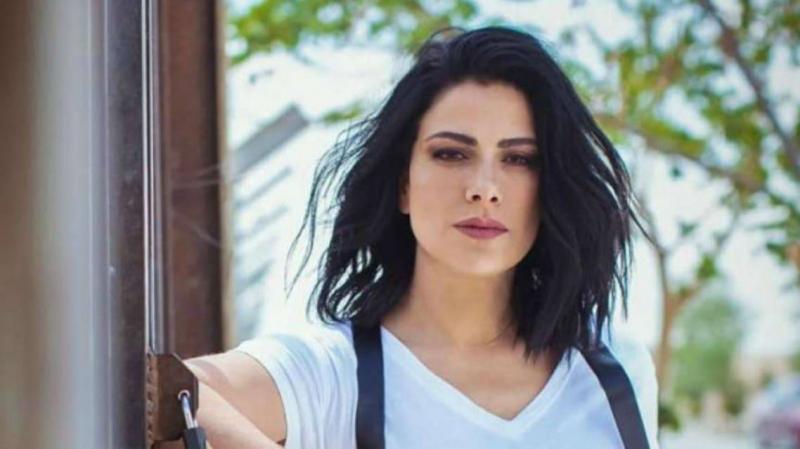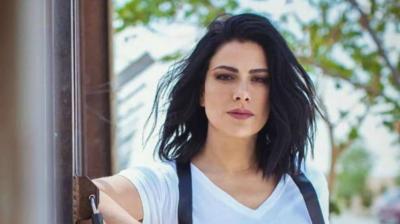She always emphasizes that she is against the notion that art must contain a message, and that the idea should stem from the actor's personality. The primary goal of art is entertainment, amusement, and showcasing life stories... Recently, the star Saba Mubarak has been involved in many works and intense artistic activities to tell various other stories, embody different characters, and present them to a wide audience across the Arab world. Alongside her consecutive successes, including "Anbar 6" and "Daughters of Abdul Rahman," she anticipated the success of the latter, but did not expect the overwhelming audience interaction, especially with its screening at the Cairo International Film Festival and winning an award. At the same time, her latest film "Amira" faced unusual backlash, and she is preparing for the film "Arnous" and the series "Night of the Fall," among other details she discussed in a special interview with "Al Arabiya.net."
**How did you find the success of the recently aired series "Anbar 6"?**
I was very happy about it, especially since the series is inspired by real events concerning the story of three remarkable women facing challenges in the hidden world behind the walls of a prison, where some inmates are unjust and others are victims; nonetheless, they are victims of the cruelty of society and the circumstances they have endured. The number of works that have addressed what happens inside women's prisons is very limited. There's a realm of stories and secrets that we try to unveil through the series amidst the severe suffering of the inmates of this prison and their harsh struggles with societal conditions, via many human stories narrated by the prisoners.
**Tell us about the production behind the scenes.**
When the series was offered to me, I found it different from the works I had done before because it's based on real events about stories within the prison world that have shaken public opinion in the Arab world. The series consists of several seasons, the first season comprising 12 episodes. We prepared for it for six months before filming began, as it is considered one of the most significant Arabic dramas.
The filming took place entirely in Lebanon, where special prison sets were constructed in expansive areas to enhance realism. The producer of the work, Jamal Sinan, made sure to provide everything needed for the project to appear impeccable, just as it did on screen in its initial episodes.
**You've achieved extraordinary success with the screening of "Daughters of Abdul Rahman" at the Cairo Film Festival?**
To be honest, I did expect the film to succeed, but I never anticipated such a massive response from the audience. They reacted strongly to the film, which I felt through the applause of the attendees with every scene, and the cheers and cries of praise emerging from their hearts in joy, which delighted me immensely. When it was decided to produce this film, I bet on the audience, and the greatest challenge for me personally was to make them love the film. My wish was to create a film that is commercial but primarily artistic.
This was my specific challenge as Saba in production, and my ambition was to create a commercially successful and respectful artistic film. The second challenge was to win awards. However, I cannot deny my happiness in the film receiving the Yusuf Sharif Rizkallah Award based on the audience's vote at the Cairo International Film Festival.
**You have produced television works before, but is "Daughters of Abdul Rahman" your first film production? Were you not afraid of the experience?**
Indeed, I previously produced two works— "Obour" and "Tawq Al-Asfalt"—but the screenplay of "Daughters of Abdul Rahman" caught my attention unusually when presented to me by Zaid Abu Hamdan, the film's writer and director, seeking support for its production. After reading it, I decided to be the producer. When it was presented to me by producer Shahinaz Al-Aqqad, it didn’t take long for me to agree to the project as it presented a new challenge for me. We agreed to create respectable entertainment and to believe in what is within us. The most important thing is to adhere to our principles and ensure it's respectable art.
**What motivated you to act in and also co-produce the film?**
The film addresses women's issues faced by girls in the Arab world under societal pressures that may lead parents to be harsh on their daughters to maintain their image in society. The film centers around four sisters, each leading a different life, but they share the struggle of societal interference in their lives, leading their father to pressure them to satisfy the community.
When Zaid presented the film's characters "Zainab, Samah, Amal, and Khatam," I was particularly drawn to Amal’s character, despite the beauty and modernity of Samah’s character, which includes suffering details. This character quickly became like a child to me.
**How did you prepare for the character, considering your appearance was very different?**
Indeed, I was keen to significantly increase my weight to align with Amal's character, gaining about 15 kilograms to achieve the required look. It was difficult to hire a special effects designer to create makeup and tricks to gain weight due to the film's budget, so it was easier for me to gain weight. The character has been wearing the niqab for years and is significantly overweight and older. Although I faced challenges with losing the weight again, the challenge in this film was worthwhile, as this work was a massive adventure for me. I had to be flexible enough to appear in different, even shocking shapes, as people don't often see us in such ways.
**However, you appeared differently from the beautiful lady roles?**
I am fundamentally an actress, and I don't only play roles of beautiful women in high heels; that's part of our profession and its challenges. I get bored quickly, so if I don't find something new to present, I would retire from art entirely. Therefore, I continuously seek newness. Boldness is the secret to success and presenting something different. More importantly than appearing attractive is to present significant work that makes me proud and instills confidence in people regarding us. This film poses substantial challenges, especially since it isn't commercial and is more related to festivals and attracting filmmakers. However, it expresses society and presents an issue that concerns everyone, which could yield considerable public success.
**The movie "Amira" faced significant backlash. Why?**
Since the film premiered in September 2021 at the "Venice Festival," it has been shown in the Arab world and viewed by thousands of Arab, Palestinian, and global audiences, with a general consensus always agreeing that the film depicts the issue of prisoners positively and humanely while clearly criticizing the occupation. Palestine is a part of me; my mother is Palestinian, and the Palestinian cause is the most important issue I have adopted artistically. Therefore, the film team announced that any screenings of the film would halt, demanding the establishment of a specialized committee consisting of the prisoners and their families to view and discuss it. We firmly believe in the purity of what we presented in the film "Amira," without any offense to the prisoners or the Palestinian cause.
**What’s new for you?**
I just finished filming the series "Night of the Fall" with Syrian director Nagy Tami, starring Tarek Lotfy and Ahmed Siyam from Egypt, along with Basem Yakhour and Kinda Hanna from Syria, in addition to a group of Iraqi drama stars, written by Egyptian writer Magdy Saber. The series addresses the practices of terrorist groups and unfolds in a political social context, wherein I portray the character "Joanna," a doctor experiencing oppression.
Currently, I am awaiting the release of the film "The Squad," in which I play a pivotal character, a Libyan woman whose role will reveal details as the film is released. The film will surprise the audience and addresses the airstrike executed by the army in Libya against "ISIS." The film is written by Omar Abdel Halim, directed by Ahmed Nader Jalal, and stars Ahmed Al-Sakka, Diab, Karim Fahmy, Asser Yassin, Sherif Mounir, and Mahmoud Abdel-Moghny, along with a large group of artists appearing as guest stars.




